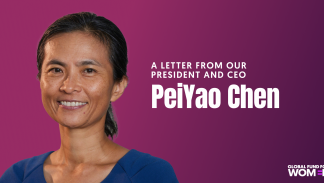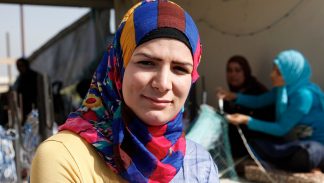Transformative Women's Leadership: An Interview with Red Flag Women’s Movement, Sri Lanka
Meneha Kandasemy, 49, is a founding member of the Red Flag Women’s Movement, a grantee partner in Sri Lanka. Global Fund for Women interviewed Meneha as part of a learning project evaluating our FLOW program and how the groups involved built transformative women’s leadership for social change.
Red Flag Women’s Movement Sri Lanka is the independent women’s wing of the Ceylon Plantation Workers Union. It works with women who work at tea plantation as well as domestic women workers who were originally from the plantation estates. Most of the workers are Tamils, an ethnic minority discriminated against in Sri Lanka. In 2012, Red Flag Women’s Movement registered the first domestic women workers’ union in the country. This was a significant achievement, and will help address the need for better representation of women’s interests in male-dominated trade unions.
A key feature of Red Flag Women’s Movement’s approach to building young women’s leadership is a mentorship system. Young women participate in a series of awareness raising workshops and skills training, and are then paired with seasoned leaders in different positions, including joint presidents and joint secretaries. Young women learn hands-on and with the guidance of their mentors. It takes about three years to train them. Afterwards, they are able to lead and act as representatives of their colleagues during negotiations with employers and government officials for domestic workers’ rights.
Why is it important to promote young women leaders for your organization now?
It cannot be emphasized enough that young women’s leadership is essential to sustain social movements in Sri Lanka. Organizations in the country’s social movements are led by mostly older activists, even as old as 70 years old. Without the involvement of the next generation of leaders, these organizations could die upon the demise of their founders. So building social movements entails developing the leadership of younger generations. Red Flag Women’s Movement sets this kind of an example in movement building. It demonstrates the real possibility of transforming young women to lead trade unions and altering the dominance of male leaders in this field. The presence of young women leaders in the trade union has paved the way towards more inclusiveness and equality in the governance and membership of trade unions.
[Reflecting on your organization’s work in promoting young women leaders] what are you most proud of?
We are most proud of the transformation we have witnessed among the young women themselves, as well as the transformation that these women have brought about to the state of domestic workers in Sri Lanka. Most of these young women we trained to become leaders had low levels of literacy and did not have any formal education. Now we are proud that, on their own, they are able to negotiate with employers and government officials to demand for their rights. They have contributed to changing the public’s negative reference to them as “servants” to a more positive assignation as “domestic workers,” signifying that they are accepted as legitimate members of the labor force who have fundamental human rights.
What advice would you share with other young women interested in being involved?
Young women should take the initiative to be involved in social movements. It is important that they seize every opportunity to contribute to social change. Every change counts. Small changes are the foundation of any big transformation. Only by becoming involved in generating social change can they also change the conditions of their own oppression and foster an environment that will help them realize their rights.
What advice would you share with another organization trying to promote women leaders?
We want to urge other organizations in social movements to invest consciously in building the leadership of young women in their respective organizations. They bring new energy and they bring a different set of knowledge and skills. For example, the young leaders were instrumental in facilitating the use of new technology, particularly teaching domestic women workers to use mobile phones. Developing young women’s leadership helps change gender stereotypes that assume men are the only qualified leaders. Their leadership is critical to sustain the work of organizations and maintaining social movements that adhere to gender equality.
“We need to create layers of leadership, including harnessing the leadership of young women, to sustain social movements.”
Meneha Kandasemy


